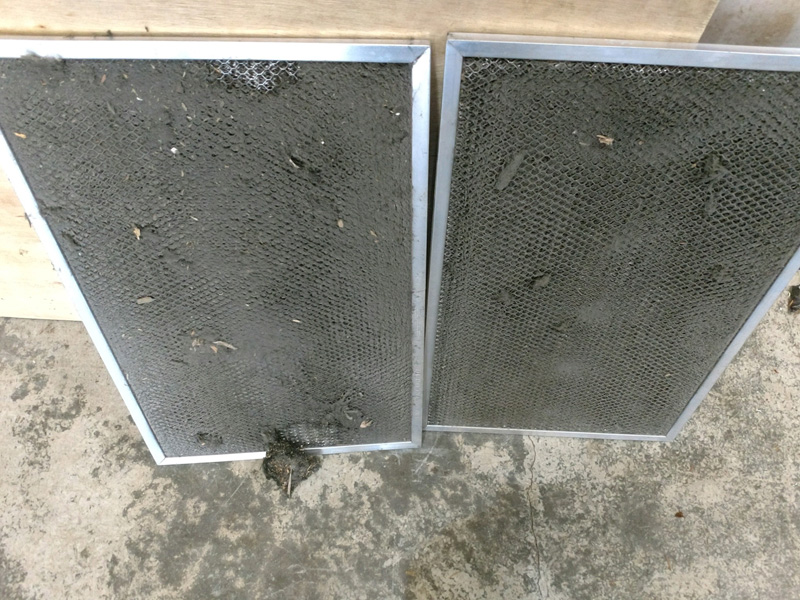Clogged air filters are probably the leading cause of breakdown for air conditioners and HVAC systems. That’s the main reason why changing air filters is so important.
Air conditioners and heaters depend on airflow. With impeded airflow, the system doesn’t work as well, and problems arise. Here are four reasons why it’s so important to change your air filter, and what could happen if you don’t.
4 Reasons to Change the Air Filter on Your AC / Furnace

1. Changing the Air Filter Saves You Money
Yes, you have to pay for the air filter. But the more clogged your air filter gets, the harder your system has to work. That means it is using more energy to produce and push the same amount of cool or warm air. Using more energy means you pay more for the same benefit. That’s a bad deal.
And in case you’re wondering, the air filter does get used in both summer and winter because the same fan moves the air either way. The mechanism for producing the warm or cool air may be different, but the fan that moves it and the filter the air passes through is the same.
Changing the air filter also saves money because it extends the healthy life of your HVAC system. And as you can imagine, air conditioning and heating repairs cost a lot more than buying an air filter every few months.
2. Changing the Air Filter Improves Performance
As time goes by, air filters will get clogged by various types of debris. This makes it harder to produce the same amount of warm or cool air.
This means, especially in the extreme hot and cold months, a fresh air filter will help your home warm up and cool down faster than it otherwise would. If it seems like it’s taking longer to warm up or cool down your house lately, there’s a good chance your air filter is the main culprit.
And by the way, if you want us to come out and do a maintenance check, we can also show you where your air filter is and how to change it. Sometimes, it is a little tricky. Here’s a quick guide on how to change your air filter yourself.
3. Changing the Air Filter Improves Indoor Air Quality
There are all kinds of pollutants and particulates floating around inside and outside. A good air filter will capture many of these and thus improve your air quality. Especially if you have kids, elderly residents, or people with medical conditions such as asthma or allergies, pristine air quality is a must.
Consistent replacement of your air filter is a low cost way to make a big difference in your air quality.
A saturated air filter will struggle to corral things like dust, spores, pollen, pet dander, hair, and microorganisms. Plus, all that gunk can collect moisture and lead to mold growth. If the mold gets in your ducts and the inner workings of your HVAC system, now you’ve got a serious and much more costly problem, for your health and your pocketbook.
4. Changing the Air Filter Reduces Your Environmental Footprint
Because a clean air filter allows your air conditioner and furnace to work more efficiently at heating up and cooling down the house, you will use less energy and thus reduce the cost your HVAC system is putting on the environment – especially if you’re relying on gas or electric power.
What Happens If You Don’t Change Your Air Filter?
If you neglect to change your air filter frequently enough, a number of problems will begin to mount over time.
First, because your air conditioner and heater will have to work harder, this extra strain will increase the wear and tear on the system and can cause it to overheat and break down. Again, in our experience, clogged air filters are the number one cause of costly and expensive repairs for HVAC systems. Extending the useful life of your system saves thousands of dollars.
Also, very old air filters can start to break down themselves, and this may release fibers into the air handling system. These fibers can interfere with the functionality of the HVAC system and require expensive repair and maintenance.
And, as already mentioned, not changing your air filter will make your home take longer to heat up or cool down, increasing your costs for no extra benefit.
The health problems that can be caused by the buildup of mold are well-known, and if mold is infesting your HVAC system, then your family is breathing unhealthy air. You can prevent most or all of this simply by regularly changing your air filter.
One way to tell if it’s well past time to change your filter is if there’s a buildup of dust near your vents, including on furniture near the vents. If you see this, then your air filter is probably well past due for replacement.
How Often Should You Change Your Air Filter?
There isn’t a one-size-fits-all answer to this. Energy Star recommends a minimum of changing your air filter every three months. Some experts recommend every month.
But really this depends on several factors, such as the type of air filter you use, and how often you use your air conditioner and heater.
In the mild climate of the Pacific Northwest and Snohomish and North King County, we have pretty temperate springs and falls, and many people don’t use their systems at all during those months. There would obviously be no reason to change the filter if it isn’t being used.
But in summer and winter, it probably gets pretty heavy use. So keep an eye on it, and don’t let it sit there unchanged for too long.
As for the type of air filter, lower quality fiberglass air filters need to be replaced more frequently than higher quality ones.
If you want a professional HVAC repair and maintenance technician to come take a look at your system or show you how to change your air filter, feel free to schedule an appointment, and Bob will come out to take a look.
We are often booked several months out, so if you suspect problems with your HVAC system, don’t wait too long to call us!












Great article! & convinced me to get on your schedule delivery offer, whatever that is…!
Peter & Sandy Burr